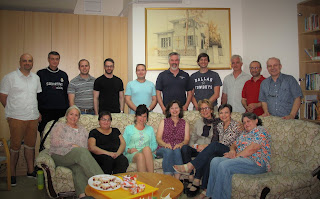Who are the heroes? Part IV YU Heroes
There were also some other foreigners in Yugoslavia during the war. They were missionaries who decided to stay regardless of the war.
Two couples from the International Mission Board of the Southern Baptist Convention, US stayed. They were Bill & Debbie Steele and Randy & Joan Bell.
Bill Steele was team leader for the IMB missionaries in Serbia at the time the war broke out. He quickly shifted gears to helping local NGOs and churches deal with the influx of Internally Displaced Peoples (IDPs). Bill encouraged Randy & Joan in their own efforts to help those caught in war torn places.
Bill made an agreement with the UNHCR in Belgrade to distribute aid to 125,00 Serbian refugee children in Serbia proper. They provided school supplies worth $850,000 which were distributed through evangelical churches.
Steele partnered with evangelical churches to distribute items normal for school (backpacks, notepads, paper, pencils, protractors; etc.). Local churches received no funds except to cover their costs. The students who received the supplies were not required to attend any services or be church members. Steele’s example is one of a person from a smaller agency (IMB SBC) helping a larger agency (UNHCR) to do its job well. He and his wife blessed many children during this terrible time of war and deprivation. They served during a harrowing time at great personal cost.
Randy Bell helped to take funds to those stranded in the Republika Srpska, the Serb enclave in Bosnia. Since Bosnian Serbs were seen as the enemy, no agencies seemed disposed to help Serbian displaced people driven out of Bosnia or Croatia into the Republika Srpska. Randy, however, answered the call and earned the nick name “Bosna Ekspres”, the “Bosnian Express”, for his regularly carrying aid from Belgrade to Republika Srpska.
Randy took Bibles and money for food to the Serbian refugees in the Republika Srpska. They also took money to give people to buy small livestock: goats, pigs and sheep. Some of these Serbian refugees had been pushed out of Croatia. The infrastructure in Bosnia & Hercegovina was very poor: bad roads, no water, no electricity, no heating, etc. Many refugees were squatters in abandoned and in some cases bombed out houses. The IMB built a school for children.
Getting to the Republika Srpska of itself was hard. The roads were bad and the conditions very difficult and dangerous. There were many border crossings and problems with finding fuel.
Bread of Life, a relief agency in Belgrade, gave Randy a visa to work in the Republika Srpska. However, the lack of infrastructure caused political instability. Many agencies feared being involved there.


Comments
Post a Comment